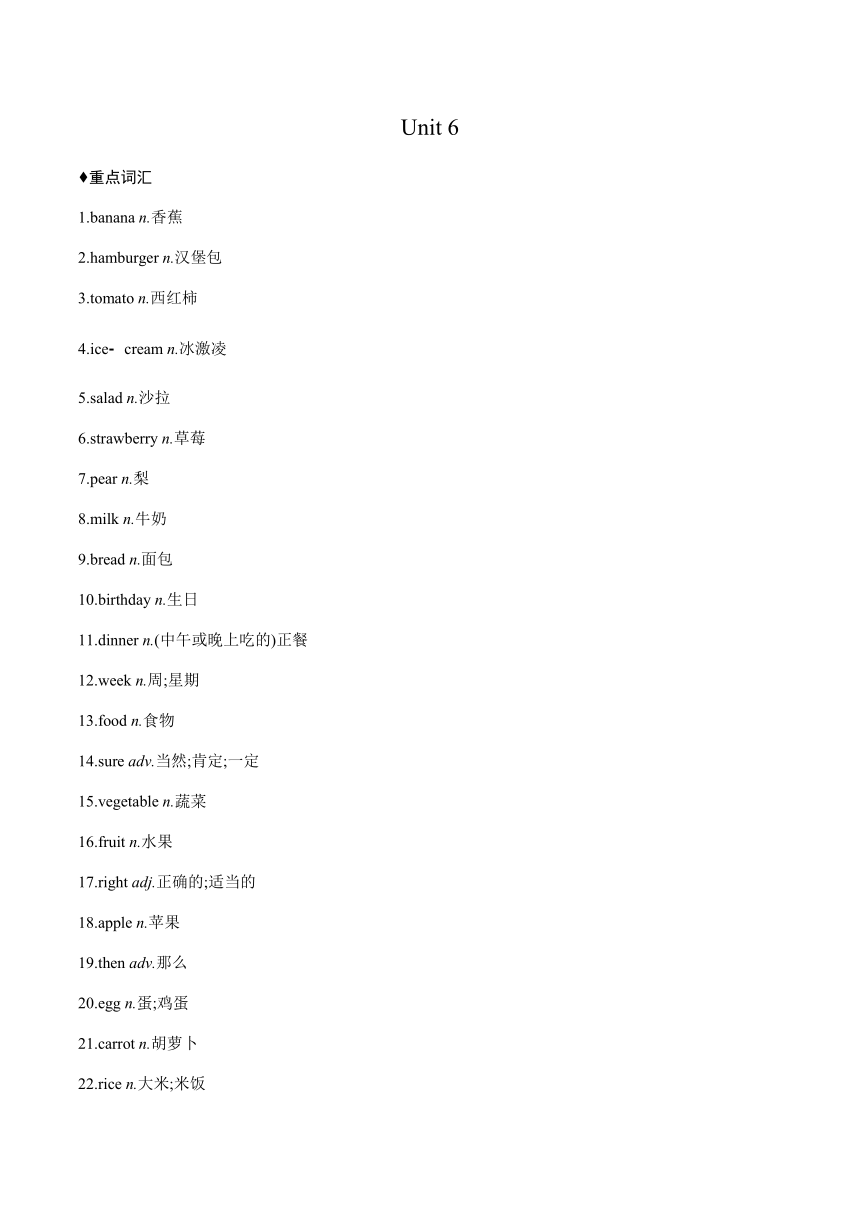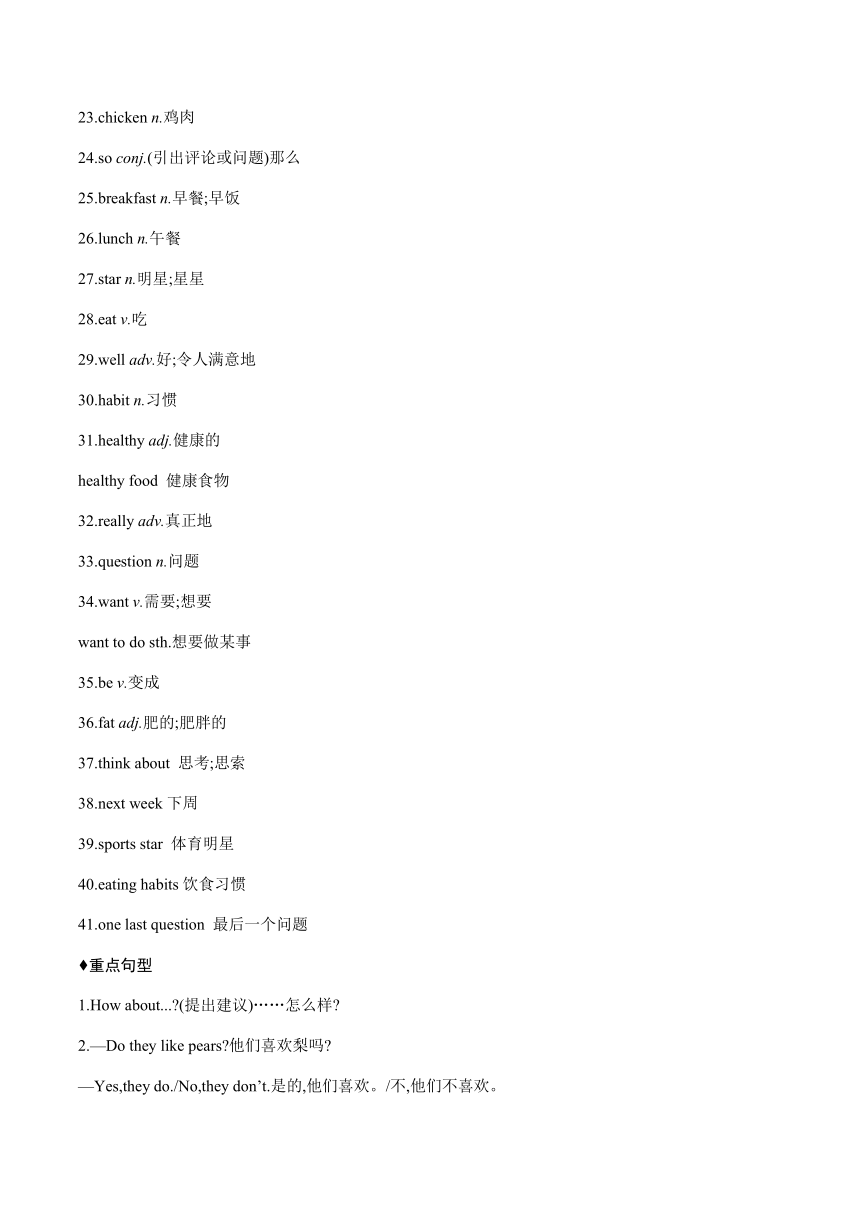人教版英语七年级上册Unit 6 Do you like bananas? 知识点背诵
文档属性
| 名称 | 人教版英语七年级上册Unit 6 Do you like bananas? 知识点背诵 |

|
|
| 格式 | zip | ||
| 文件大小 | 15.7KB | ||
| 资源类型 | 教案 | ||
| 版本资源 | 人教新目标(Go for it)版 | ||
| 科目 | 英语 | ||
| 更新时间 | 2020-09-06 00:00:00 | ||
图片预览


文档简介
Unit
6
?重点词汇
1.banana
n.香蕉
2.hamburger
n.汉堡包
3.tomato
n.西红柿
4.ice?cream
n.冰激凌
5.salad
n.沙拉
6.strawberry
n.草莓
7.pear
n.梨
8.milk
n.牛奶
9.bread
n.面包
10.birthday
n.生日
11.dinner
n.(中午或晚上吃的)正餐
12.week
n.周;星期
13.food
n.食物
14.sure
adv.当然;肯定;一定
15.vegetable
n.蔬菜
16.fruit
n.水果
17.right
adj.正确的;适当的
18.apple
n.苹果
19.then
adv.那么
20.egg
n.蛋;鸡蛋
21.carrot
n.胡萝卜
22.rice
n.大米;米饭
23.chicken
n.鸡肉
24.so
conj.(引出评论或问题)那么
25.breakfast
n.早餐;早饭
26.lunch
n.午餐
27.star
n.明星;星星
28.eat
v.吃
29.well
adv.好;令人满意地
30.habit
n.习惯
31.healthy
adj.健康的
healthy
food
健康食物
32.really
adv.真正地
33.question
n.问题
34.want
v.需要;想要
want
to
do
sth.想要做某事
35.be
v.变成
36.fat
adj.肥的;肥胖的
37.think
about
思考;思索
38.next
week下周
39.sports
star
体育明星
40.eating
habits饮食习惯
41.one
last
question
最后一个问题
?重点句型
1.How
about...?(提出建议)……怎么样?
2.—Do
they
like
pears?他们喜欢梨吗?
—Yes,they
do./No,they
don’t.是的,他们喜欢。/不,他们不喜欢。
3.—Does
she
like
tomatoes?她喜欢西红柿吗?
—Yes,she
does./No,she
doesn’t.是的,她喜欢。/不,她不喜欢。
4.I
like
fruit,but
I
don’t
like
vegetables.我喜欢水果,但我不喜欢蔬菜。
5.What
do
you
like
for
breakfast?你早餐喜欢吃什么?
6.So
what
fruit
do
you
like?那你喜欢哪种水果?
7.I
don’t
want
to
be
fat.我可不想变胖。
?重要知识点
知识点1sure的用法
1.sure作形容词,表示“无疑;确信;有把握的”,指主观上对某事相信无疑,不涉及有无客观根据,常在句中作表语。常见搭配:be
sure
of/about“确信……;对……有把握”;for
sure“无疑;肯定”。例如:
Are
you
sure
about
that?那件事你肯定吗?
2.sure还可作副词,意为“当然;不用客气”,常用于口语中。例如:
—Will
you
open
the
wine?你把葡萄酒打开好吗?
—Sure,but
where
is
it?没问题,但酒在哪里呢?
知识点2right的用法
1.right作形容词,意为“对的,正确的”,其反义词为wrong,意为“错误的”。在英语口语中表示认同某人的观点,常用“That’s
right./You
are
right.”。
2.right还可以用作名词,意为“右边”,其反义词为left,意为“左边”。on
the
right/left意为“在右/左边”。
知识点3healthy的用法
1.healthy意为“健康的”,其名词形式是health“健康”,其反义词为unhealthy“不健康的”。
2.be
in
good
health=be
healthy,意为“身体健康”;be
in
bad
health=be
unhealthy,意为“身体不健康”。
知识点4really的用法
1.really作副词,意为“真正地;的确;确实”。really通常置于实义动词前,系动词、助动词或情态动词之后;为了强调,也可置于系动词、助动词或情态动词前,这时系动词、助动词、情态动词要重读。注意,位置不同,意义也有所差别。例如:
We
really
don’t
like
her.我们确实不喜欢她。
We
don’t
really
like
her.我们并不大喜欢她。
2.口语中常用“Not
really.”表示否定、怀疑或者不相信等。例如:
—Do
you
want
to
come
along?你要一起去吗?
—Not
really.不是很想去。
—He’s
leaving
tomorrow.他明天要走了。
—Not
really.不会吧。
3.really的形容词形式为real,意为“真实的;真正的”。
知识点5habit的用法
habit作名词,意为“习惯”,常用搭配:the
habit
of
doing
sth.“做某事的习惯”;out
of
habit“出于习惯”;have/be
in
the
habit
of“有……的习惯”;develop/get
into
the
habit
of“养成……的习惯”。例如:
He
has
the
habit
of
getting
up
early.他有早起的习惯。
知识点6want的用法
want作动词,意为“需要;想要”。常见搭配:want
to
do
sth.“想要做某事”;want
to
be“想成为”;want
sb.(not)
to
do
sth.“想让某人(不)做某事”。例如:
I
want
to
eat
an
apple.我想要吃一个苹果。
I
want
to
be
a
teacher.我想要成为一名老师。
I
want
you
to
play
basketball
with
me.我想让你和我一起打篮球。
6
?重点词汇
1.banana
n.香蕉
2.hamburger
n.汉堡包
3.tomato
n.西红柿
4.ice?cream
n.冰激凌
5.salad
n.沙拉
6.strawberry
n.草莓
7.pear
n.梨
8.milk
n.牛奶
9.bread
n.面包
10.birthday
n.生日
11.dinner
n.(中午或晚上吃的)正餐
12.week
n.周;星期
13.food
n.食物
14.sure
adv.当然;肯定;一定
15.vegetable
n.蔬菜
16.fruit
n.水果
17.right
adj.正确的;适当的
18.apple
n.苹果
19.then
adv.那么
20.egg
n.蛋;鸡蛋
21.carrot
n.胡萝卜
22.rice
n.大米;米饭
23.chicken
n.鸡肉
24.so
conj.(引出评论或问题)那么
25.breakfast
n.早餐;早饭
26.lunch
n.午餐
27.star
n.明星;星星
28.eat
v.吃
29.well
adv.好;令人满意地
30.habit
n.习惯
31.healthy
adj.健康的
healthy
food
健康食物
32.really
adv.真正地
33.question
n.问题
34.want
v.需要;想要
want
to
do
sth.想要做某事
35.be
v.变成
36.fat
adj.肥的;肥胖的
37.think
about
思考;思索
38.next
week下周
39.sports
star
体育明星
40.eating
habits饮食习惯
41.one
last
question
最后一个问题
?重点句型
1.How
about...?(提出建议)……怎么样?
2.—Do
they
like
pears?他们喜欢梨吗?
—Yes,they
do./No,they
don’t.是的,他们喜欢。/不,他们不喜欢。
3.—Does
she
like
tomatoes?她喜欢西红柿吗?
—Yes,she
does./No,she
doesn’t.是的,她喜欢。/不,她不喜欢。
4.I
like
fruit,but
I
don’t
like
vegetables.我喜欢水果,但我不喜欢蔬菜。
5.What
do
you
like
for
breakfast?你早餐喜欢吃什么?
6.So
what
fruit
do
you
like?那你喜欢哪种水果?
7.I
don’t
want
to
be
fat.我可不想变胖。
?重要知识点
知识点1sure的用法
1.sure作形容词,表示“无疑;确信;有把握的”,指主观上对某事相信无疑,不涉及有无客观根据,常在句中作表语。常见搭配:be
sure
of/about“确信……;对……有把握”;for
sure“无疑;肯定”。例如:
Are
you
sure
about
that?那件事你肯定吗?
2.sure还可作副词,意为“当然;不用客气”,常用于口语中。例如:
—Will
you
open
the
wine?你把葡萄酒打开好吗?
—Sure,but
where
is
it?没问题,但酒在哪里呢?
知识点2right的用法
1.right作形容词,意为“对的,正确的”,其反义词为wrong,意为“错误的”。在英语口语中表示认同某人的观点,常用“That’s
right./You
are
right.”。
2.right还可以用作名词,意为“右边”,其反义词为left,意为“左边”。on
the
right/left意为“在右/左边”。
知识点3healthy的用法
1.healthy意为“健康的”,其名词形式是health“健康”,其反义词为unhealthy“不健康的”。
2.be
in
good
health=be
healthy,意为“身体健康”;be
in
bad
health=be
unhealthy,意为“身体不健康”。
知识点4really的用法
1.really作副词,意为“真正地;的确;确实”。really通常置于实义动词前,系动词、助动词或情态动词之后;为了强调,也可置于系动词、助动词或情态动词前,这时系动词、助动词、情态动词要重读。注意,位置不同,意义也有所差别。例如:
We
really
don’t
like
her.我们确实不喜欢她。
We
don’t
really
like
her.我们并不大喜欢她。
2.口语中常用“Not
really.”表示否定、怀疑或者不相信等。例如:
—Do
you
want
to
come
along?你要一起去吗?
—Not
really.不是很想去。
—He’s
leaving
tomorrow.他明天要走了。
—Not
really.不会吧。
3.really的形容词形式为real,意为“真实的;真正的”。
知识点5habit的用法
habit作名词,意为“习惯”,常用搭配:the
habit
of
doing
sth.“做某事的习惯”;out
of
habit“出于习惯”;have/be
in
the
habit
of“有……的习惯”;develop/get
into
the
habit
of“养成……的习惯”。例如:
He
has
the
habit
of
getting
up
early.他有早起的习惯。
知识点6want的用法
want作动词,意为“需要;想要”。常见搭配:want
to
do
sth.“想要做某事”;want
to
be“想成为”;want
sb.(not)
to
do
sth.“想让某人(不)做某事”。例如:
I
want
to
eat
an
apple.我想要吃一个苹果。
I
want
to
be
a
teacher.我想要成为一名老师。
I
want
you
to
play
basketball
with
me.我想让你和我一起打篮球。
同课章节目录
- starters 预备篇(2012秋审查)
- Unit 1 Good morning !
- Unit 2 What’s this in English?
- Unit 3 What color is it ?
- Unit 1 My name's Gina.
- Section A
- Section B
- Unit 2 This is my sister.
- Section A
- Section B
- Unit 3 Is this your pencil?
- Section A
- Section B
- Unit 4 Where's my schoolbag?
- Section A
- Section B
- Unit 5 Do you have a soccer ball?
- Section A
- Section B
- Unit 6 Do you like bananas?
- Section A
- Section B
- Unit 7 How much are these socks?
- Section A
- Section B
- Unit 8 When is your birthday?
- Section A
- Section B
- Unit 9 My favorite subject is science.
- Section A
- Section B
